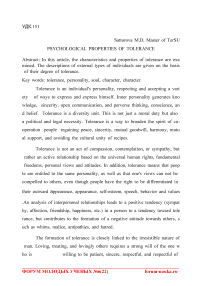Psychological properties of tolerance
Автор: Sattorova M.D.
Журнал: Форум молодых ученых @forum-nauka
Статья в выпуске: 6-1 (22), 2018 года.
Бесплатный доступ
In this article, the characteristics and properties of tolerance are examined. The descriptions of external types of individuals are given on the basis of their degree of tolerance.
Tolerance, personality, soul, character
Короткий адрес: https://sciup.org/140283222
IDR: 140283222
Текст научной статьи Psychological properties of tolerance
Tolerance is an individual's personality, respecting and accepting a vari ety of ways to express and express himself. Inner personality generates kno wledge, sincerity, open communication, and perverse thinking, conscience, an d belief. Tolerance is a diversity unit. This is not just a moral duty but also a political and legal necessity. Tolerance is a way to broaden the spirit of cooperation people regaining peace, sincerity, mutual goodwill, harmony, mutu al support, and avoiding the cultural unity of recipes.
Tolerance is not an act of compassion, contemplation, or sympathy, but rather an active relationship based on the universal human rights, fundamental freedoms, personal views and attitudes. In addition, tolerance means that peop le are entitled to the same personality, as well as that one's views can not be compelled to others, even though people have the right to be differentiated in their outward а ppearance, appearance, self-esteem, speech, behavior and values .An analysis of interpersonal relationships leads to a positive tendency (sympat hy, affection, friendship, happiness, etc.) in a person to a tendency toward tole rance, but contributes to the formation of a negative attitude towards others, s uch as whims, malice, antipathies, and hatred.
The formation of tolerance is closely linked to the irresistible nature of man. Loving, treating, and lovingly others requires a strong will of the one w ho is willing to be patient, sincere, respectful, and respectful of the character and attitude of the person he does not like. Human thinking is di rectly related to how people deal with society, people, and life. The greater the scope of man, the greater the range of the universe and th e individual, the greater the multifaceted analysis of life processes. It is nota mistake to make mistakes, but the mistaken person b elieves incorrecting and trusting mistakes. A person with this ability to think i s more likely to be tolerant. On the contrary, it is narrow-minded, stub born, criticized, criticized, or objectively critical of others' actions and actions.
It's a bad attitude to someone who does bad things, even to the opposer, eve n to those who dislike him. As a result, it affects inter-personal relationships, and hatred and anger are replaced by love.In the formation of equilibrium, one should pay special attention to the harmonization of emotional and intellectua l features of a person with social relationships, filling the sincerity, humanity, openness and wide-ranging education with the effects of education and trainin g . [3,153]
An abusive, humble person is often harsh and unjust in his dealings wit h others. These people usually push their negative traits to others. The reason for any failure, even for the Chittakkina, is seen not by themselves but by oth ers [1, 35]
Psychologist ANN Leontev approaches this issue differently and describ es it as: the person is the subject of the activity. According to K. Platonov' s interpretation, it is said that a person who is capable of working in the com munity is capable of working. Sr.Rubinstein, who tried to deepen the essence of this problem, described the individual as a complex of internal conditions t hat would change the direction of external influences. People's affection, symp athetic attitude, true dialogue, compassion, and respect for each other represent their inner beauty, richspiritual image. One of the outstanding q ualities of our nation is loyalty friendship. Where is a friends hip, love, compassion, faithfulness, justice, and truth are found. And this, in tu rn, gives the spirit of the man a spirit of reflection, and leads goodn ess and sincerity.
Список литературы Psychological properties of tolerance
- Sh.M.Mirziyoyev's critical analysis, strict discipline and personal responsibility - should be the daily rule of every leader's activity. Tashkent: Uzbekistan, 2017. - 104 p.
- E.G.Goziev, R.Yu.Toshimov Methodology of Teaching Psychology Tashkent. 2003 y.


